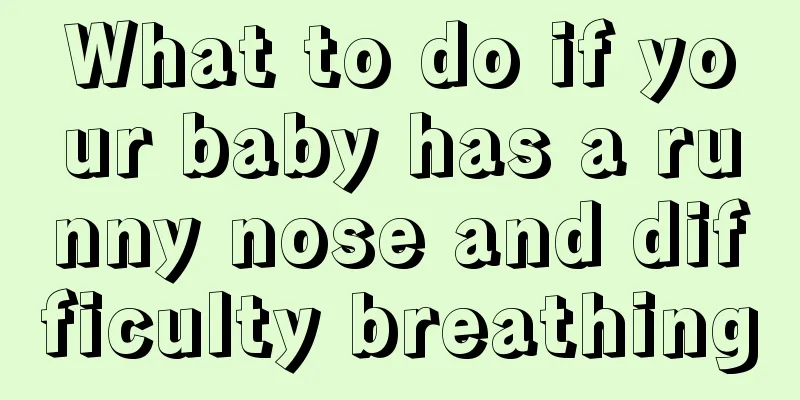How to adjust the blocked nose of a two-month-old baby?

|
Nasal congestion is a common physical problem in newborns. It is caused by excessive nasal secretions in the nasal cavity, or by problems with the body's immune system, which lead to colds, fevers and other problems. It can also cause nasal congestion. It is very important to treat nasal congestion, otherwise it will easily cause the child to be unable to breathe. The editor has found a small solution to relieve nasal congestion for everyone. Nasal congestion is a great pain for adults, and even more so for babies. The baby's nasal mucosa is soft and rich in blood vessels, so it is easy to become congested when suffering from a mild cold, making the originally narrow nasal cavity even more blocked. At the same time, the constant appearance of nasal secretions is also a common cause of nasal congestion. If there are nasal crusts in the baby's nasal cavity that cause blockage, the nasal crusts should be removed for the baby in time. You can use a small clip specially used to clean the baby's nasal crusts (it is best to do this when the baby is asleep). If the nasal crust is relatively dry, let the baby inhale some moist water vapor, which can make it easier to remove the nasal crust and relieve nasal congestion symptoms. You can put hot water in the bathroom to create steam, let your baby inhale it for 3 to 5 minutes, and then remove the nasal crust. Wet a soft towel or gauze, take a corner and twist it clockwise into a cloth twist, gently insert it into the baby's nasal cavity, then twist it counterclockwise and pull it outwards to bring out the nasal secretions. You can also use the salt water nasal wash method. Add appropriate amount of salt to cold boiled water, dip a small cotton swab in it, and clean the baby's nasal cavity. Be sure to be gentle when cleaning. Cleaning every day can relieve the symptoms of nasal congestion. When using a cotton swab, the baby will move around, so be careful not to let the cotton swab hurt the nasal mucosa. In daily life, you should pay attention to keeping warm and preventing colds, keep the indoor air fresh, the humidity and temperature appropriate, and reduce the indoor dust density. If your baby has persistent symptoms such as nasal congestion, runny nose, sneezing, etc., it is best to seek medical attention immediately. The above content can provide some clues for everyone who is at a loss when taking care of their child with a stuffy nose. Because the newborn baby's body is relatively fragile, the above physical methods are the best. The editor recommends that you try not to use medication for your child, because a large number of medications contain hormones and antibiotics, which will affect the child's growth. |
<<: What should I do if my baby coughs and has a stuffy nose?
>>: What is happening when my eight-month-old baby has nose bleeding?
Recommend
What is the reason why children vomit after eating in summer?
In the summer, because the weather is relatively ...
How to train your baby to sit
As babies grow up, they will learn various abilit...
White spots in infants' mouths
If there are white spots in the mouth of infants ...
What to do if your one and a half year old baby has rhinitis
Babies are relatively young and have weak resista...
Six common misunderstandings about medication for children
1. Misuse of antibiotics Epidemiological surveys ...
Mild ADHD
Every parent should realize the serious impact of...
What is the standard for baby’s development at four and a half months?
Four months is a critical period for the baby'...
The 8 best times to educate your children
American psychologist and family issues expert Ro...
How can we improve children’s unclear speech?
Generally speaking, it is normal for children to ...
What to do if your child has a cold or cough
Cold is a common disease in life. Anyone can catc...
What to do if your child's mouth is swollen
Children are relatively young, so they are very n...
What should I do if my child has a fever of 40 degrees at night?
When children are young, their physical constitut...
6 home-cooked dishes to help children improve their brain power
All parents want their babies to be smart, but th...
What should I do if my child has lymphadenitis and fever?
The symptoms of lymphadenitis are often swollen l...
Why does the back of the head sweat when sleeping?
We all know that half of a person's life is s...









